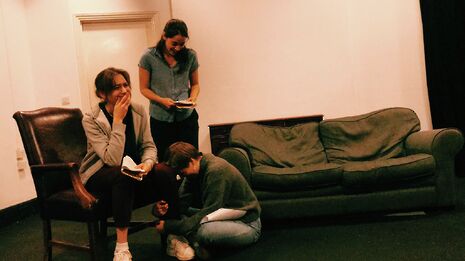Di & Viv & Rose Review
A ‘sepia-soaked account of a friendship,’ this play has a ‘universal appeal’ but doesn’t quite hit the mark in some areas -

As the title suggests, Di & Viv & Rose opens and is centred around three women, who share university halls, move into a house together, forge friendships, weather trials, and so on, together, as friends do. What one must assume to be playwright Amelia Bullmore’s intention is that this is, for the most part, an eighties’ tinged, sepia soaked account of a friendship that is sometimes durable, sometimes strained, but almost always valuable.
"Di & Viv & Rose is the kind of play that has a nicely universal appeal"
Generally this sense of the play was aptly conveyed through astutely designed set and costume and a wonderfully enjoyable soundtrack.
The production took a few scenes to jolt to a start, but once it did the energy brought to the stage was incredibly welcome. Di & Viv & Rose is the kind of play that has a nicely universal appeal – there are some lines you might like because you’re a student, there are some you might like because you’ve been around long enough to remember what life was like in the 1980s, there are some you might like because they’re plain funny. Directors Hannah Lyall and Olivia Miller and all three actors (Annabelle Haworth, Chloe Lansley, and Grainne Dromgoole) are clearly aware of this virtue and lines were delivered with aplomb. Indeed, when it came to the acting, all brought engaging moments to the stage. It is Lansley who must be commended for her consistency and energy onstage – she has a lovely gift for delivering even the most contrived lines (and unfortunately there is a tendency towards these in Bullmore’s script) with a simplicity and sincerity that just keeps them on the right side of realism.
This said, Lansley, playing the unabashedly effusive Rose, perhaps had an easier job than her two fellow actors. Dromgoole and Haworth had steadier, more reserved characters to tackle, and watching Haworth’s sturdy, tight-lipped Viv slowly unfold into what a good character always is – that is, flawed but still loveable – was a particular joy. Viv’s steady transition from overly ambitious student to high-flying academic to – eventually – a woman who is, at her core, intensely lonely was perhaps the most obvious character development of the play, and despite a few blander moments near the start (which can easily be put down to opening night nerves), dealt with well by Haworth, whose care and attention to detail was a gift to more attentive members of the audience. Her and Lansley had a particularly delightful chemistry – generally speaking, the stage was most invigorated when all three actors were together, communicating, joking, allowing the audience a window into their friendship.
It was not only the acting that benefitted from attention to detail; the production itself profited greatly from some quiet but incisive directorial choices. The decision to barely use Corpus door – and instead make almost the entire auditorium feel a part of the shared flat at Mossbank in the first half of the play – was smart. Similarly, the incorporation of props and a general commitment to realism was particularly lovely, and served the production as a whole well.
Much of what failed to hit the mark, then, about this production, lies partly with the script. Dealing with intense subject matter such as loss and sexual assault is never easy, and Bullmore’s play unfortunately handles both in a manner which at best can be described as clumsy. There is not much point in criticising a play when reviewing a student production, so I won’t – but the actors seemed aware of the uncomfortable nature of sections of the play and shied away from them when the production would have been better served with a more active, engaged approach to the emotionally taxing content. Just as sections of the play itself seemed clumsy – particularly in communicating aptly the passing of time, as well as some of the more affecting issues at hand – some of the direction seemed a little loose or not as well-handled as it could have been. Music consistently playing between or underneath certain sections of dialogue served to make the issues at hand feel even more cliché, and transitions were not as well-thought out as they could have been.
The problem, it seems, with Di & Viv & Rose is that it is at its heart a story about growing up, and the friendships that withstand doing so, but none of the characters quite seem to grow up. Part of this is certainly down to the limitations of the plot and writing. But so much happens, seemingly, to these characters. Even if the way they express themselves doesn’t change, perhaps more could have been done to shift characterisation or even staging to really reflect to the audience the sensation of time passing, and these women changing and growing. It would have done more to show the audience what also stays the same, and why. “You look just the same, Rose,” Viv remarks to her friend halfway through the second act. Perhaps she means it as a compliment, but for this production, it is all too evident that it’s for this reason it doesn’t quite hit the mark.
 News / Uni Scout and Guide Club affirms trans inclusion 12 December 2025
News / Uni Scout and Guide Club affirms trans inclusion 12 December 2025 News / Cambridge study finds students learn better with notes than AI13 December 2025
News / Cambridge study finds students learn better with notes than AI13 December 2025 News / Cambridge Vet School gets lifeline year to stay accredited28 November 2025
News / Cambridge Vet School gets lifeline year to stay accredited28 November 2025 Science / Did your ex trip on King’s Parade? The science behind the ‘ick’12 December 2025
Science / Did your ex trip on King’s Parade? The science behind the ‘ick’12 December 2025 News / Pembroke to convert listed office building into accom9 December 2025
News / Pembroke to convert listed office building into accom9 December 2025









